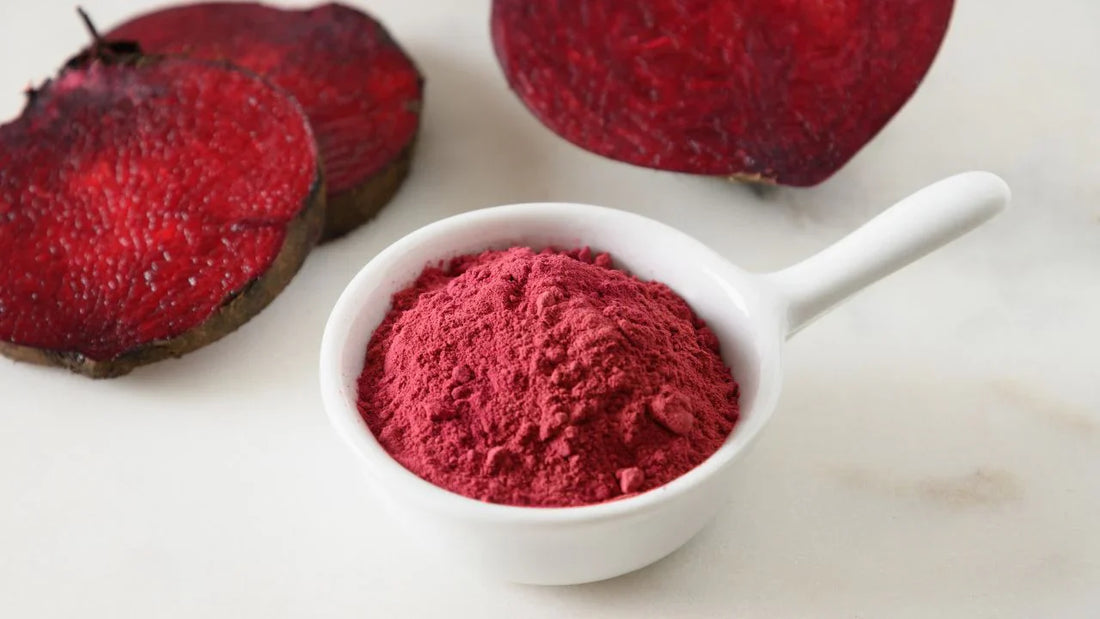
What are the benefits of beetroot?
Share
Beetroot: A Nutrient-Rich Superfood with Powerful Health Benefits
Beetroot is packed with nutrients that may enhance athletic performance, support heart health, and help regulate blood sugar levels. The natural nitrates in beets and beetroot juice can improve blood flow, while antioxidants may offer protection against certain cancers. As a result, many modern juices and health drinks now include beetroot as a key ingredient.
Although beetroot belongs to the same family as sugar beets, they differ genetically and nutritionally. Sugar beets are white and typically used for sugar extraction, whereas beetroot—usually red or golden—does not yield sugar and is valued for its health properties.
In this article, we explore beetroot’s health benefits, its impressive nutrient profile, and ways to incorporate it into your diet.
Health Benefits of Beetroot
1. Heart Health and Blood Pressure
A 2015 study involving 68 individuals with high blood pressure showed that drinking 250 ml of beetroot juice daily significantly lowered blood pressure. This effect is likely due to the high nitrate content in beets, which helps dilate blood vessels and improve circulation. A 2019 study confirmed a temporary drop in aortic systolic pressure after beetroot juice consumption in healthy individuals.
However, these effects are short-lived, and a 2024 review points out that current evidence is still limited. Always consult a healthcare provider before making changes to blood pressure medications.
2. Diabetes Management
Beets contain alpha-lipoic acid, an antioxidant that may help reduce glucose levels and improve insulin sensitivity. A 2019 review found that alpha-lipoic acid supplements helped reduce symptoms of diabetic neuropathy, though the amounts used in studies were much higher than those found naturally in beets. More research is needed to confirm the impact of dietary beetroot on diabetes.
3. Digestive Health
One cup of beetroot contains about 3.8 grams of fiber, supporting healthy digestion and regular bowel movements. Including beets in your diet can help boost your overall fiber intake.
4. Athletic Performance
Beetroot juice has been linked to better oxygen use in muscles during exercise. A 2019 study found that high doses improved time trial performance in cyclists. However, other studies have shown mixed results, especially in recreational athletes. A 2024 study suggested that even small amounts of beet juice may enhance aerobic capacity and heart function. Further research is ongoing.
5. Cancer Prevention
Compounds in beetroot, such as betalains, have shown potential in disrupting cancer cell mutations. Although more research is needed, these antioxidants may play a role in reducing cancer risk.
Nutritional Profile
One cup of raw beets provides approximately:
- 58.5 calories
- 13 g of carbohydrates (9.2 g sugar, 3.8 g fiber)
- 2.2 g of protein
Beetroot also offers vitamins and minerals such as:
- Vitamin C
- Vitamin A
- Folate
- Magnesium
- Phosphorus
And in smaller amounts:
- Calcium
- Iron
- Thiamine
- Riboflavin
- Vitamin B6
- Copper
- Selenium
The leafy beet tops are particularly rich in iron, vitamin C, vitamin A, magnesium, potassium, and folate.
How to Enjoy Beetroot in Your Diet
Beets can be eaten raw, roasted, steamed, boiled, or pickled. Here are some delicious ideas:
- Blend peeled beetroot with fresh orange, mint, pineapple, apple, lemon, or ginger to make a nutritious juice.
- Grate raw beets into salads or coleslaw.
- Pair roasted beets with goat cheese for a flavorful dish.
- Serve sliced raw beets with lemon juice and chili powder.
When buying beetroot, choose ones that feel heavy and are free of damage. Fresh green tops are a sign of quality and are also edible.
Store beets in a sealed bag in the refrigerator to keep them fresh for days.
Potential Risks
Beetroot juice can cause red or pink urine or stools—this harmless condition is called beeturia. Those with a history of kidney stones should moderate their intake of beet greens, which are high in oxalates. People with sensitive stomachs or irritable bowel syndrome may also experience digestive discomfort after consuming beet juice.
Conclusion
Beetroot is a nutritious food that supports various aspects of health. While it offers many benefits, it’s best consumed as part of a well-balanced diet rich in diverse nutrients.

